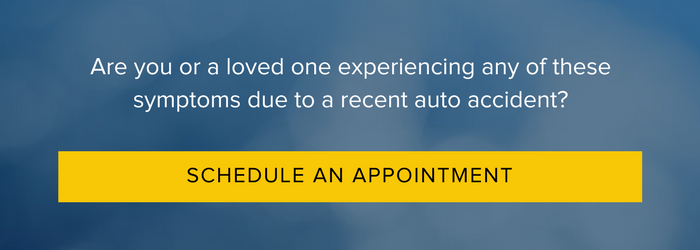Neurology
What is Neurology?
Neurology is the diagnosing, treating and managing of disorders of the brain and nervous system. After an auto accident, many injuries can be neurologically related, even if it’s not recognized as a neurological issue initially. Because these issues can be very serious, it’s important to seek treatment right away.
Why See a Neurologist After a Car Accident?
When people hear neurology, they normally think of the brain, but neurological care goes much deeper. Pain and injuries that are rooted in neurological issues can show up in ways that don’t appear to be neurologically related. The nervous system can be traumatized in even a minor-impact collision.
The first step to getting treatment after a car accident is undergoing a proper diagnosis. Your doctor will likely conduct a neurological examination, which checks your vision, hearing, strength, sensation, balance, coordination and reflexes. Those with severe symptoms, such as severe headaches, seizures, unrelenting vomiting or symptoms that continue to get worse, may undergo an MRI or other diagnostic imaging tests.
Neurological Symptoms
After a collision, you may begin to experience symptoms related to neurological issues. These symptoms have a wide range of severity and can begin mild but grow worse.
Common Neurological Symptoms Include:
- Headaches
- Migraines
- Depression
- Changes in mood
- Partial or complete paralysis
- Muscle weakness
- Partial or complete loss of sensation
- Seizures
- Difficulty reading and writing
- Decreased cognitive abilities
- Pain
- Decreased alertness
Types of Neurological Injury
Peripheral Neuropathy
Peripheral neuropathy is a very common condition. It refers to damage to the peripheral nervous system, which connects the central nervous system (the brain and spinal cord) to the rest of the body. When the peripheral nervous system is damaged, you may feel pins and needles in an extremity, or unable to sense heat or cold, or possibly lose motor function of the affected limb or extremity.
Radiculopathy
Radiculopathy is pain, weakness, numbness and tingling in your extremities as the result of a compressed nerve root due to an injury to your spine. Radicular symptoms can be constant or can come and go. It can be treated with conservative measures, injections, medications and in some cases surgery is required depending on a lot of factors. Radicular symptoms should be reported to your doctor so that they may create a treatment plan to help determine where the root of the issue is stemming from so that a course of therapy or other measures may be prescribed to assist with alleviating the symptoms that you are experiencing.
Lumbar Radiculopathy
Lumbar Radiculopathy is when there is nerve irritation caused by disc injuries to the spine that are causing the legs to experience symptoms such as numbness, traveling pain, and tingling. Pain may also be felt in the hip and patients can also experience symptoms down the leg through to the foot and toes. You may want to call it “sciatica;” however, sciatica is different than lumbar radiculopathy in that lumbar radiculopathy is due to nerve irritation and sciatica is shooting pain.
Cervical Radiculopathy
Cervical Radiculopathy is the same concept, but the numbness and tingling would travel from the neck spinal disc injuries to the left and/or right arms all the way to the fingers depending on what level of the disc that is injured. Cervical symptoms can also move through the shoulders since that upper body area is all connected. It is very important to describe the sensations that you are feeling to your physician so that proper testing may be ordered and a course of treatment is planned out accordingly.
Thoracic Radiculopathy
Thoracic Radiculopathy is a series of symptoms in your mid-back area of the spine due to compression of a nerve root. Thoracic Radiculopathy isn’t as common as lumbar and cervical, but symptoms of thoracic radiculopathy can also travel to the upper extremities, shoulders and also around the chest and rib cage.
Would You Like to Receive More Helpful Tips?
Neurology Pain Management Treatments
Treatments for neurological pain management vary widely depending on the individual and the injuries being treated.
Migraines and headaches may be treated with a prescription medication the doctor sees appropriate over your injury. Sometimes, headaches and migraines can resolve on their own after an accident. Other times, they are signs and symptoms of a deeper issue.
Common treatments and therapies for numbness and tingling include first determining the cause of the issue. Which nerve is damaged? Which level of the vertebrae is being affected to cause the issue? A physical exam and diagnostic imaging will help the physician properly diagnose your issue before creating a treatment plan.
Leave it to our specialists to diagnose and treat your neurological issues. Contact Florida Physical Medicine today to begin treatment.


